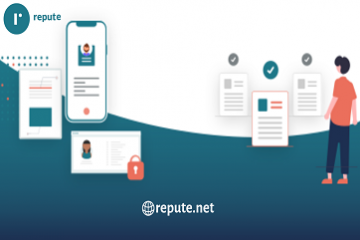We started Repute Network with a singular mission – To make trusting simpler.
Zeroing in on the problem
We want to take you through exactly what we mean by the trust that we wish to simplify.
Back when communities were small, getting into a transaction with someone was easy. People knew each other and accountability ran high. People knew that George was curious, Tom was a voyeur or Scrooge was greedy.
But, as interactions became more widespread and communities grew, fraud, mistrust and misrepresentation became rampant.
There are so many clients who won’t pay their dues, customers who run away with rented assets, landlords who refuse to return the deposit amounts, users who onboard with fake credentials and so on.
In a world where we constantly deal with new people, trust is important to establish especially when we step into new environments.
Knowing exactly who we are transacting with saves both our money and peace of mind.
The good thing is that we have all the data that can help us elevate our experiences, but this data lies split across multiple platforms.
What we at Repute wish to do as we simplify the research that goes before entering into any transaction is help you source authentic data from the right places.
Data that can help you know one’s identity, their past behaviour and help you project what their future interactions would be like.
Let’s go through the kind of trusts we wish to inspire and how:
1. Identity-based trust
This is the most basic kind of trust you can expect from a person who is entering into a transaction with you.
We have often submitted our government-issued documents to prove we are who we claim to be. This KYC process (Know Your Customer) helps companies verify our identity / our age or our address.
But our identities lie fragmented all over the digital world. Many organisations now rely on someone’s Linkedin profile to check the authenticity of a candidate’s claims on their resume.
As expected, these broken ways to do identity verifications make for simple ways for people to cheat the system with fake aadhaar documents or counterfeited driving licenses etc.
Each business has its own needs, and within a single business, there may be multiple use cases that require different identity solutions.
In a space as dynamic as identity, with constantly changing regulations and verification methods, companies that build their own tools find themselves investing more and more resources to stay on top of industry trends.
At Repute Network, we have created a customisable gateway for onboarding that allows users to fetch their pre-verified credentials directly from authentic sources.
The businesses can also include liveness check, image forensics, bank account verifications, criminal record check etc. As it is not possible for a business to focus every day on improving its identity verification stack, we have and would constantly aspire to roll all the latest tech into one perfectly-tailored verification solution
2. Deterrence-based trust
This is the kind of trust that comes with following all the rules.
If you were to stop paying your rent to your landlord, your landlord would be well within his rights to oust you from the property given the “rules” mentioned in the rental agreement.
Your landlord can be expected to trust someone to pay their rent monthly to avoid the consequences of not following the terms of the agreement.
This is the most fundamental, basic kind of trust that works on the rules that have been set in place that prevent one person from taking advantage or harming another.
When we engage in business with someone, we have contracts that ensure one party can trust another to hold up their end of the bargain. In organisations, we have policies and procedures that provide boundaries for how we interact and treat each other.
One would only break such trust when the incentive of not following the rules is greater than the consequence.
Your landlord might straight-up refuse to pay back your deposit amount. The incentive of keeping your INR 200,000 might be greater than his fear of having an FIR lodged in his name in the future.
Unless he were to know that his behaviour was getting recorded and his refusal to pay the deposit amount would create a hindrance in finding a tenant in the future, his ways may not change soon. That is what we are trying to create. A self-regulated consortium of players that record your present behaviour to use as a benchmark for the future.
3. Knowledge-based trust
This level of trust comes from knowing the person well before entering into a transaction with them. It means you’ve had enough experience and knowledge of someone’s behaviour to know pretty well how they will react and behave in a relationship with you. This is the level of trust that most of our day-to-day professional relationships experience.
If you loan your friend, John, some money, from your previous experiences you can gauge how likely he is to return it to you soon. If he dilly-dallied a lot last two times in repaying you, the third time is not likely to be much different.
But you knew John personally and that is where all the difference lies. Or, does it?
Think about how you select which movie to watch on Netflix on your free Saturday night. A movie with an IMDb score of greater than 8 is almost never likely to be a bad choice. You assimilated the ratings given by thousands of users to draw a conclusion based on data. This is exactly how reviews and recommendations work.
At Repute, we wish to help you with the data that is required in interpreting someone’s past behaviour to make an educated guess about their behaviour in the future.
As users, if you always pay your rent on time and keep assets secure, you need not have to pay so much deposit with little hope of it being returned. That’s the world we envisage where everyone’s good data can help them land better deals.
The heart of the effort
“In God we trust, rest all must bring data.”
This quote rings very close to everything we stand for.
We envision a world where people and businesses would be able to use their data – a summation of their identity & past records – to show credibility and bargain for better user experiences. Also, to use it to make informed decisions about who to transact with and who to not.
While our products are designed to empower everyone with more control over their data and benefit immensely from the ownership, at the heart of our effort lies protecting each customer’s privacy.
No matter how our journey pans out, consent and privacy would always take the centrestage as we move ahead making real our bold vision.
The road ahead
We know that this is not going to be easy, but it will definitely be worth it.
With talks of data privacy, ownership and sharing finally gaining momentum in India, we want to be at the forefront of the revolution that we have always felt was long-time coming.


0 Comments